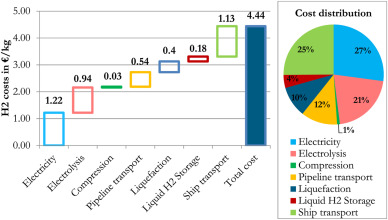In a recent publication titled “A Techno-Economic Analysis of Global Renewable Hydrogen Value Chains,” a team of researchers Jolie Kenny, David Timoney, and Eoin Syrondelved delved into the economic and technical aspects of renewable hydrogen production and distribution across the globe. This comprehensive study is poised to offer significant insights for stakeholders in the hydrogen industry.
This study is highly relevant as it provides a detailed analysis of the costs and technical challenges associated with renewable hydrogen value chains globally, which could guide future investments and policies in this burgeoning sector.
Findings of the Research
The study offers several key findings:
1. renewable hydrogen production costs vary significantly across different regions, influenced by local renewable energy resources and technological efficiencies.
2. The logistics of hydrogen transportation and storage present substantial technical and economic barriers, which need to be addressed to make hydrogen a viable global energy carrier.
3. Technological advancements in electrolyzers and fuel cells are pivotal in reducing overall costs and improving efficiency.
Potential Applications
The findings have multiple applications:
1. Policymakers can use the cost analyses to formulate strategies and subsidies to foster a competitive renewable hydrogen market.
2. Energy companies can leverage these insights to invest in regions with favorable production conditions.
3. The study highlights technological advances that can steer research and development efforts toward the most impactful innovations.
Market Relevance
The relevance of this research to the hydrogen market cannot be overstated. With the global push towards net-zero emissions, understanding the economic dynamics of renewable hydrogen is essential for both public and private sectors. The analysis provides a roadmap for cost reduction and efficiency improvements, critical for making hydrogen a cornerstone of future energy systems.
Methodologies
The study employed a techno-economic modeling approach, integrating data from various renewable energy sources and hydrogen production technologies. This method allows for a detailed cost-benefit analysis and identifies the most impactful areas for technological improvement.
Implications for the Hydrogen Industry
The broader implications of this research are profound. By highlighting the cost disparities and technical challenges, the study lays the groundwork for targeted interventions. It suggests that investments in technological advancements and infrastructure development are crucial for making renewable hydrogen competitive with traditional energy sources.
Key Takeaways
“A Techno-Economic Analysis of Global Renewable Hydrogen Value Chains” offers valuable insights into renewable hydrogen production’s economic and technical aspects. The study underscores the importance of regional analysis, technological innovation, and strategic policymaking in driving the adoption of renewable hydrogen.
Visual elements and diagrams from the study, such as cost breakdowns and efficiency graphs, can provide a clearer understanding of these findings. Where relevant, they will be included to illustrate key points concisely and effectively.
This research piece is an essential read for anyone involved in the hydrogen industry, from policymakers to energy companies. It offers a grounded perspective without overstating the significance of its findings.
